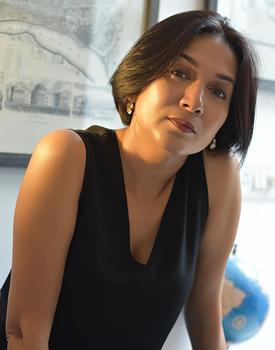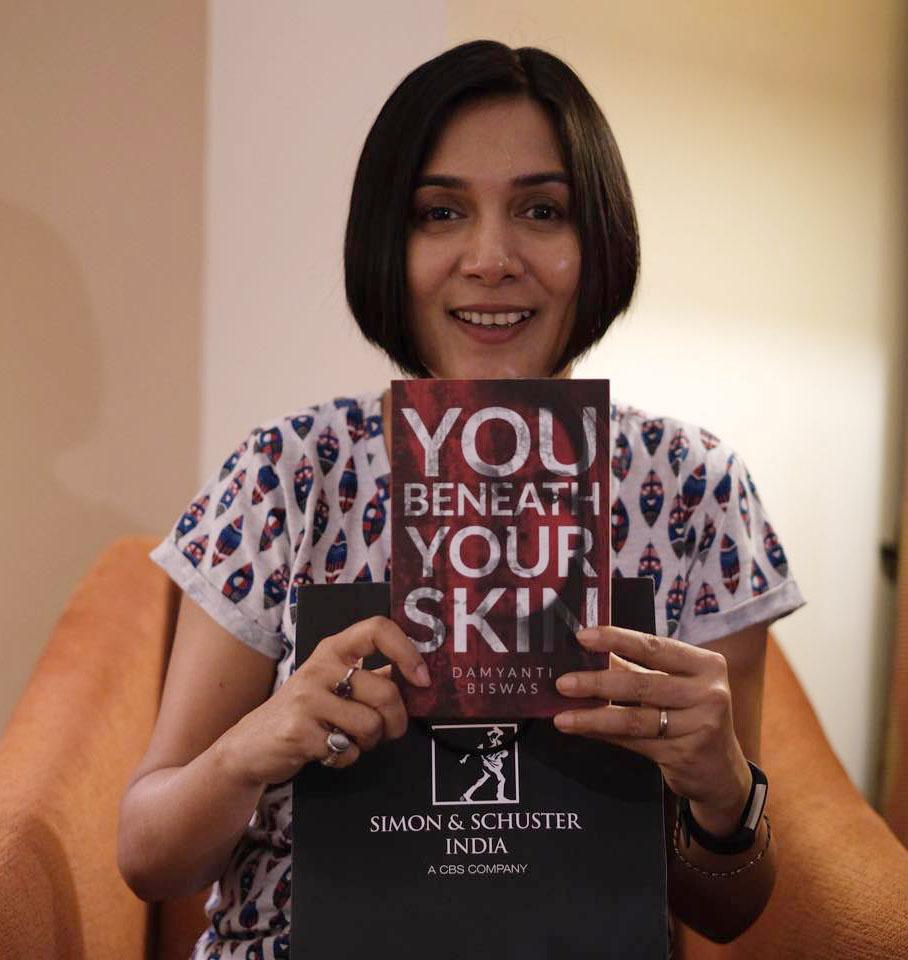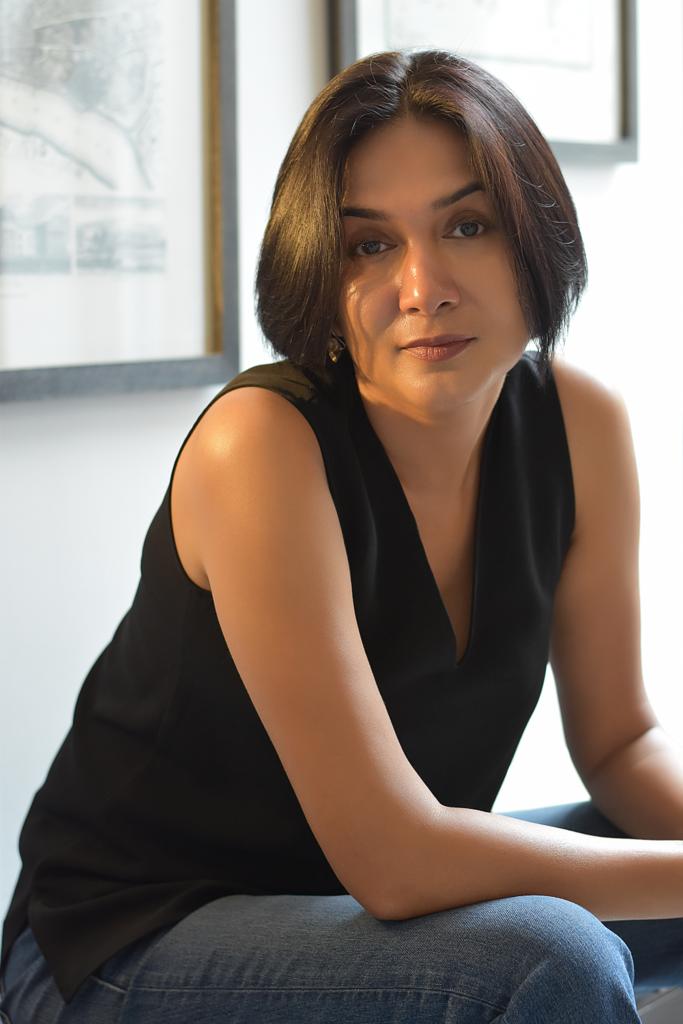(June 12, 2023) Damyanti’s school life involved an emphasis on the sciences. Only the losers took arts — she was told. Through it all, fiction kept her sane, or so she felt. So much so that she would hide novels behind Chemistry and Physics tomes. Books were her only escape and refuge. She read through all of the books in her father’s collection which ranged from Chekov to Flaubert to Borges to Walt Whitman and Shakespeare. She was a bookworm then, and stayed one down the years.

“As a child I learned to tell stories before I could read. My parents or grandma would pick up a comic book and tell me the storyline, and then I could repeat it back to them verbatim—without understanding a word of the writing,” smiles author Damyanti Biswas, in an exclusive with Global Indian. The Singapore-based author’s new book The Blue Bar, which was recently released in the US, opened at No.2 spot in the bestsellers list above Scottish crime writer Ian Rankin, which is a huge achievement for an Indian writer.
The Blue Bar
Damyanti started writing her US debut, The Blue Bar, at a workshop run by the Booker-shortlisted Romesh Gunesekera in 2018, who taught her many techniques over an intense week. The Sri Lanka born British author’s writing prompt was to depict a character who’s being watched but isn’t aware of it. “My response turned into the first chapter of The Blue Bar: Tara being watched, while posing in a tiny silver blouse and a blue-sequinned saree, by someone at a crowded Mumbai railway station,” says Damyanti, who then let her curiosity lead her into the story.
“Who was watching her? Why? Who were the people in her life? What was her story? And that led to an entire novel,” informs the author whose Indian debut was called You Beneath Your Skin. Based in New Delhi, it was about serial killings of women, their bodies defiled, burned with acid, and left in trash bags. For The Blue Bar, she did a spurt of research in Mumbai. Damyanti visited police stations, Bollywood sets, interviewed police officers and Bollywood directors, walked the streets and the slums. Her book delves into a realistic world of Bollywood, dance bars and policemen.
“As an Indian writer, to have a commercial crime novel top the charts was a unique experience,” shares the author. The Blue Bar will be released in India later this year or early 2024. She says the best feedback has been from Mumbaikars who found the book very well researched, and from Westerners who thought the book transported them into the alleyways of the city. “I write dark crime novels, so during audience interactions, I’m often surprised by questions from teens who have clearly read my work. They have very insightful viewpoints,” feels Damyanti, who says her books end up challenging patriarchy.
A bookworm’s journey to becoming a writer
Born in Bhilai (back then it was in Madhya Pradesh and now Chattisgarh), which she describes as a small dustbowl town, Damyanti went to Lady Brabourne college in Kolkata where she studied English Literature with Honours. “I was a regular at the British Council and the American Library in Kolkata, and often scored higher in my papers on comparative international literature than all others,” she recalls. Reading remained the highlight of her college years.

Damyanti never thought of herself as a writer. “That happened after I was married and in Malaysia, without a job. My husband encouraged me to write and bought me a second-hand laptop with the keys I and Y missing,” she quips. She wrote numerous short stories and her work has been published in Smokelong Quarterly, Ambit, Pembroke Review, Griffith Review among many other magazines in the US, UK and Australia.
Life in Singapore
Damyanti says life in Singapore is as safe and curated as it can be in a tiny island nation with some of the strictest laws in the world. “After living for years in Delhi, it was a very different experience, especially to feel safe as a woman at all hours of the day and night in all parts of this city-state,” says the novelist. In the nearly two decades that she has been away, Damyanti visited India more than once a year. “I plan to travel back more as the years go by,” says the author, who also serves as one of the editors of The Forge literary magazine.

She likes to describe herself as an omnivore when it comes to books. “On a given day I might read poems by Mary Oliver, flash fiction by Lydia Davis or Amy Hempel, short stories by George Saunders or Jhumpa Lahiri, noir by Fuminori Nakamura or S A Cosby, Scandinavian crime by Jo Nesbø or ÅsaLarsson, a Yanagihara or an Atwood novel, romance by Emily Henry or Helen Hoang.”
Damyanti says she recently went on a fantasy reading spree. “I read essays and memoirs. My favorites keep changing, and I can be very excited about one author one day, and another the next,” says the author who has been short-listed for Best Small Fictions and Bath Novel awards. She is already working on the sequel to The Blue Bar. “It is called The Blue Monsoon, which will be released in October this year,” informs Damyanti, who also has a women’s fiction on submission to editors which is about a harrowing mother and daughter relationship. “I am already outlining another crime novel,” she informs.
She may be living in Singapore but Damyanti is connected to India in many more ways. She is a supporter of the project WHY, a program that provides quality education to underprivileged children in New Delhi. While Damyanti’s ambition has always been to live in a home with more books than any other items, she likes to indulge in gardening, binge watch shows. “On any given day, I try and write for the first hour after waking up after which I do Yoga, followed by household chores. On most days, the writing part swallows up everything else,” smiles the author.

